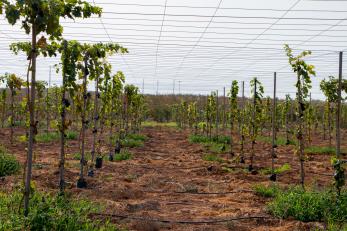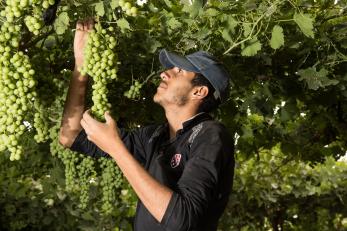Helping Jordanian farmers reduce water consumption

The USAID Water Innovation Technologies Project (WIT) is helping farmers in two Jordanian governorates to save water resources and cut down on electricity bills by introducing water-efficient technologies and practices.
Under the USAID WIT, the International Center for Biosaline Agriculture (ICBA) and the International Water Management Institute (IWMI) is working to improve water use efficiency on farms in Mafraq Governorate and Azraq district, by linking farmers to the private sector, specifically suppliers of water-saving technologies and service providers to increase the irrigation efficiency by alleviating constraints on access to water-saving technologies.
The project is building the capacity of suppliers and service providers to deliver customized solutions to farmers to save energy required for pumping and water for irrigation. Moreover, it is helping to stimulate the demand for water-saving technologies and practices by influencing the behaviour of pioneer farmers, which is achieved through the demonstration of different water technologies on many dominant crops in both areas. Additionally, data-driven irrigation scheduling would help farmers in following advanced practices to reduce water consumption on their farms and associated costs.

The project started producing positive results as one of the farmers, Mr Abu Kishek, had succeeded in saving around 20% of his water use since March 2018. What is more, he also saved annually, one-third of his electricity bills between April 2018 and September 2020. His farm has now become a popular site among neighbouring farm owners who want to learn about water-efficient technologies.
For example, Mr. Fadel Al Mughairbi, a farm owner in Mafraq Governorate, decided to upgrade the irrigation system on his two farms from a virojet system (140 litres/hour) to pressure compensating online and inline systems. One of his farms covers an area of 760 dunams planted with 390 dunums of olives. Before installing the new irrigation system, he used to lease his neighbour’s well for two days per week and pump water from his own well and his neighbour’s well for 22 hours each day. After installing the new irrigation system on the olive trees, he noticed that water from his well was actually enough. So he cancelled the lease agreement with his neighbour and consequently saved money.
According to Mr. Fadel Al Mughairbi during the field day held at his farm in 2019, his investment in the upgraded irrigation systems resulted in a 25% reduction of water use and a cut of 40% of electricity bills after the installation of the systems in 2018.
Influenced by the efforts of the WIT partner suppliers and service providers, early adopters in Mafraq and Azraq have optimized 11,610 dunums with a metered cumulative water savings of 9,570,696 m3 representing annual 40% water use reduction, where the majority of these savings are achieved from farms who changed from high flow emitters to low flow pressure compensating to September 2020.
Improving irrigation efficiency in the face of increasing costs of irrigation is a necessary condition for reducing both pumping costs and thus maintaining farmers’ net incomes and decreasing the over-abstraction of groundwater.